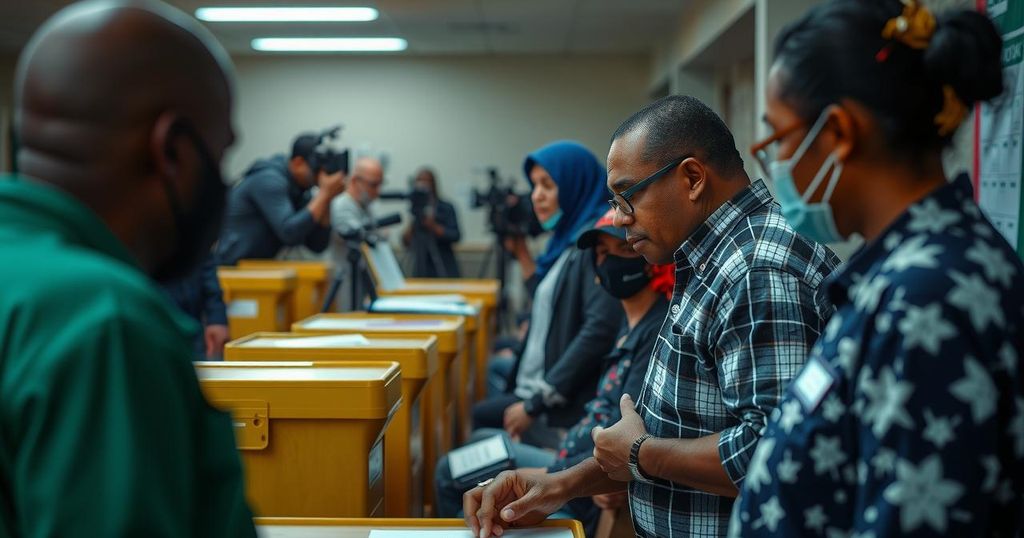Mauritius Elections: A Test of Stability Amid Political Turmoil

Mauritius held parliamentary elections amidst a phone-tapping scandal affecting political figures. Voter turnout was 70% as the two main political blocs campaigned on issues like poverty and living costs. Observers noted risks of electoral fraud, while broader concerns about governance and corruption continue to loom over the country’s political landscape.
Mauritius held its parliamentary elections on Sunday, with the electorate focusing on economic stability and governance amid a significant phone-tapping scandal engulfing political figures. The elections occurred after a historic cession of the Chagos Islands from the UK to Mauritius, raising expectations for Prime Minister Pravind Jugnauth’s re-election. However, his campaign was marred by the leak of recorded phone conversations involving various stakeholders, sparking public outrage and governmental attempts at censorship through social media bans, which were later rescinded amid backlash. The contest for the 70-seat National Assembly was primarily between Jugnauth’s Militant Socialist Movement and the Alliance of Change, led by former Prime Minister Navin Ramgoolam. Both factions expressed confidence in electoral victory and promised to tackle poverty and the rising cost of living. As polls closed, voter turnout at 70 percent indicated significant public engagement, although concerns about electoral integrity remained. Observers from the African Union monitored the polling process, which saw heightened police presence to ensure security. Allegations of fraud were raised by Ramgoolam, although he later reported that voting proceeded largely without significant incidents. Amidst rising economic and political stability concerns, observers noted a decline in institutional integrity over the past five years, alongside growing corruption. The political landscape remains dominated by a few powerful families, with Ramgoolam and Jugnauth both representing legacies of prior leadership. Additionally, a newer coalition, Linion Reform, emerged, advocating for a break from established political lineages. The recent agreement over the Chagos Islands was seen as a pivotal achievement for Jugnauth, although lingering apprehensions about geopolitical ramifications persist. As the election results are awaited, the broader implications for democracy and governance in Mauritius remain critical. Results from this election are expected on Monday, and the outcomes will illuminate the future direction of governance in this economically prosperous Indian Ocean nation.
Mauritius, an island nation known for its vibrant democracy and economic development, has experienced various political challenges and controversies. The recent parliamentary election, its twelfth since independence from Britain in 1968, comes in the wake of a landmark agreement wherein the UK ceded control of the Chagos Islands to Mauritius, a significant political milestone. Despite this victory, the nation faces concerns about its governance, allegations of corruption, and the recent leak of recorded conversations involving political and media figures has heightened scrutiny on the electoral process and civil liberties. The historical context includes a political landscape largely dominated by a few influential families, prompting calls for reform and greater transparency in governance.
In conclusion, the recent elections in Mauritius have highlighted significant political tensions and concerns regarding civil liberties and governance amidst the backdrop of a phone-tapping scandal. The contest between established political parties and emerging reform movements illustrates the electorate’s desire for change. As Mauritius continues to navigate its post-colonial identity and democratic institutions, the outcomes of this electoral contest will be critical in shaping its future trajectory towards stability and integrity.
Original Source: www.guampdn.com








